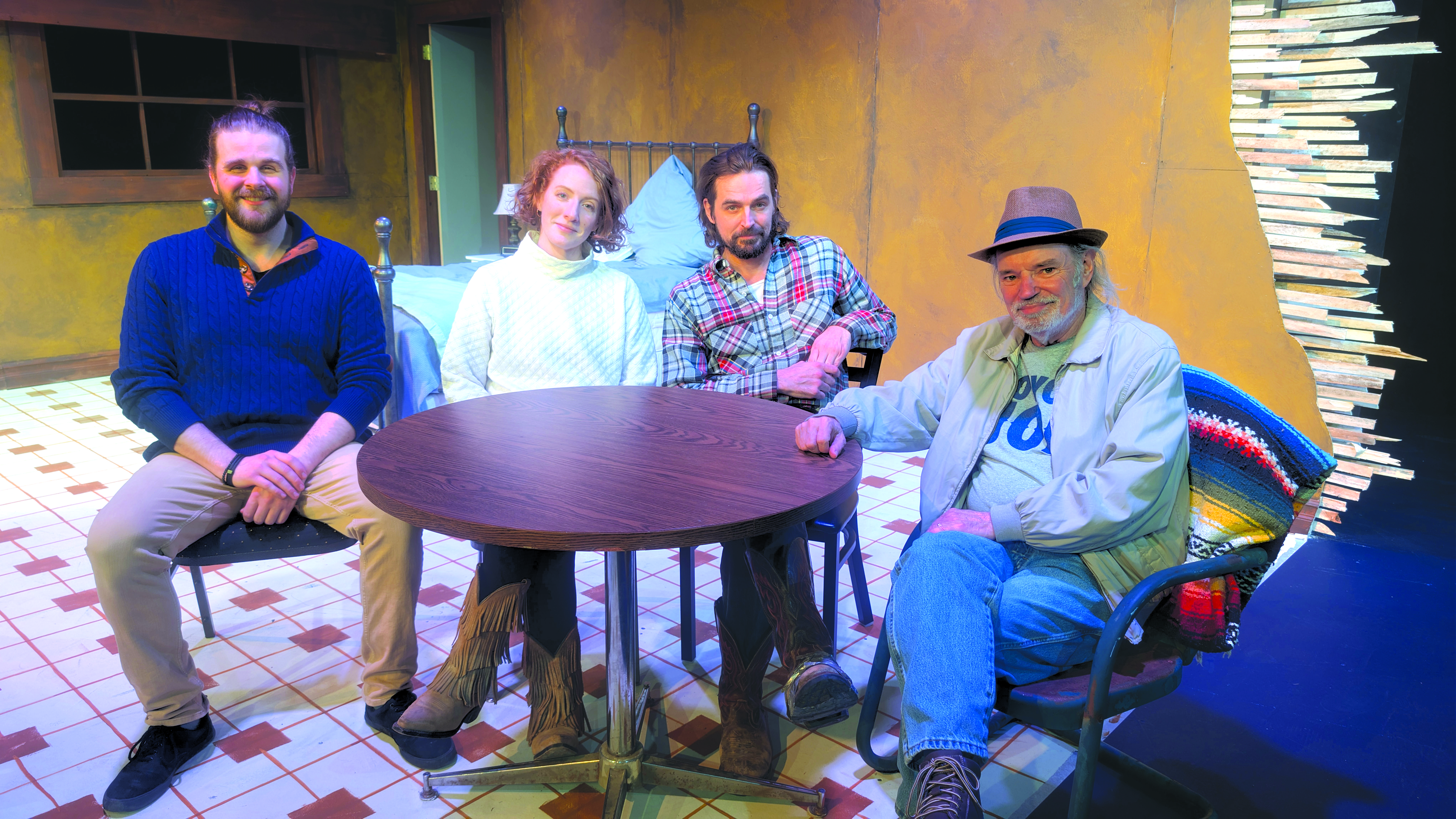Please support the Vermont Standard Annual Appeal. Help now.

WOODSTOCK
- Barnard
- Bridgewater
- Hartland
- Killington
- Plymouth
- Pomfret
- Quechee
- Reading
- South Woodstock
- South Woodstock
- West Windsor
Woodstock board decides not to charge non-users for wastewater plant upgrade
Lecture examined anti-abolitionist ‘mobocracy’ in the Upper Valley

Woodstock HS alum James Underwood chosen to compete in the cross country Junior World Championships
Historic Elm Street building has been sold; The Prince & The Pauper restaurant’s future is uncertain

Sam Shepard’s ‘Fool for Love’ will be performed at Shaker Bridge Theatre this month




Recent Sports Scores

News
January 29
6:55 am
Woodstock board decides not to charge non-users for wastewater plant upgrade
The Woodstock Town Selectboard on Monday evening agreed on a plan that calls for 100% of the allocation of payments for a proposed $35 million wastewater treatment plant bond issue to be borne by users of the sewer system served by the municipality’s main treatment facility.
The financial impact of the expected sewer fee hike on system users will be blunted somewhat by the town’s plan to use one percent of receipts from a local options tax annually, plus potential capital reserve funds to defray a portion of the bond repayment expenses each year. Non-users of the sewer system will not be assessed for any of the costs of repaying the 30-year bond debt if it is okayed by voters on Town Meeting Day on March 3.
A $1 million Congressionally Directed Spending (CDS) grant that has been awarded to the town will also be applied towards the renovation of the wastewater facility, further helping to allay some of the cost of the plant upgrade to sewer ratepayers. The grant, which was officially announced in a press release from Woodstock municipal manager Eric Duffy on Tuesday afternoon, was secured through the office of U.S. Senator Peter Welch. Harry Falconer of the Two Rivers-Ottauquechee Regional Commission (TRORC) and Jenevra Wetmore of Sustainable Woodstock assisted the Town of Woodstock in submitting the application for the grant
Between now and Town Meeting Day, Woodstock residents can learn more about the wastewater plant project and the $35 million bond proposal by attending upcoming public information sessions and selectboard meetings.
For more on this, please see our Jan. 29 edition of the Vermont Standard.
January 29
6:55 am
Pomfrret wraps up documentation to secure aid from VTrans for mudslide repairs
Town officials have completed the extensive documentation necessary to secure emergency aid from the Vermont Agency of Transportation (VTrans) for repairs to Pomfret Road and Caper Street in North Pomfret necessitated by a mudslide that occurred last spring in the early morning hours of Saturday, May 10.
During the destructive landslide, which followed more than a week of significant rainfall, a torrent of debris, rock, mud, and mature trees slid onto Pomfret Road, tumbling down from an embankment that runs along Caper Street to the north.
Pomfret Road is designated by VTrans as a “major collector” route serving travelers to and from Sharon, West Hartford, Norwich, and points beyond. Thanks to interim efforts by the local road crew, Pomfret Road remained open to two-way traffic throughout the late spring and summer of last year.
Work on a permanent fix to the areas impacted by the mudslide got underway on Sept. 10. Both roads remained one-way until the repair work by Avery Excavation Inc. of Williamstown was completed in early October.
At its regular bimonthly meeting on Wednesday, Jan. 21, the Pomfret Selectboard verified that the town, Avery Excavation, and the locally based Harrington Civil Engineers firm successfully completed the slide repairs in accordance with the VTrans emergency aid grant requirements. Actual expenses for the repair project totaled $620,015, selectboard chair Ben Brickner told his fellow board members last Wednesday. Brickner said that once VTrans reviews and okays the final expense report for the repair project, the town will be compensated through the emergency aid grant, with the state picking up approximately 96% of the project cost and the town paying the remaining 4% from its coffers.
For more on this, please see our Jan. 29 edition of the Vermont Standard.
January 28
6:55 am
Windsor County Sheriff Ryan Palmer arrested on 12 charges.
By Mike Donoghue
Senior Correspondent
Vermont State Police arrested Windsor County Sheriff Ryan Palmer on Tuesday on multiple criminal charges, including two counts each of lewd and lascivious conduct and aggravated stalking with a weapon, the Vermont Standard has learned.

Sheriff Ryan Palmer
Palmer, 39, of Windsor, was due to be arraigned on 12 criminal charges in Vermont Superior Court in Rutland on Wednesday afternoon as the Standard went to press this week.
His defense lawyer, Dan Sedon of Chelsea, said Tuesday the plan is for the first-term sheriff to enter not guilty pleas to the charges. Sedon said he and his client know little about the case: neither had been presented any criminal charges or affidavits at the time. The criminal charges also include two counts each of obstruction of justice, soliciting prostitution, inciting a felony and accessory before the fact, Vermont State Police confirmed.
Investigators secured search warrants, including for Palmer’s home and his vehicle. A delegation of Vermont State Police officers was dispatched to the Main Street home. Among the things detectives were seeking were cellphones, computers, and other electronics, police said.
Another group of state police officers took Palmer into custody and placed him in handcuffs at his county office on Pleasant Street in Woodstock for the ride to the state police barracks in Westminster for processing.
State police released Palmer on a court citation pending his arraignment. A state judge ordered Palmer to follow an 8 p.m. to 5 a.m. curfew Tuesday night.
Palmer, who serves on the selectboard for the town of Windsor, is a former board chair.
All of the criminal charges are felonies, except for the two solicitation counts, police said.
Palmer has placed former Chief Deputy Sheriff Claude Weyant, the elected high bailiff in charge. Weyant has served with the sheriff’s department for over 20 years and has been in law enforcement for almost 40 years, the department website said. Weyant will be coordinating with the next two highest-ranking officers: Lts. Rick King and Andy Leonard to help run the department.
The investigation began in July 2025, when VSP received numerous anonymous tips through the Vermont Tip Line claiming possible misconduct surrounding the Windsor County Sheriff’s Office, specifically its finances and the management of funds, state police said.
The case was assigned to detectives from the Vermont State Police in the Derby barracks to avoid any local potential conflicts of interest in pursuing the matter. Windsor County State’s Attorney Ward Goodenough also stepped away from the case and sent it to Bennington County, where veteran State’s Attorney Erica Marthage and deputy Jared Bianchi will handle the prosecution.
During the investigation, VSP said it received more anonymous tips pertaining to the financial situation and also information about possible sexual misconduct regarding Palmer.
Over subsequent months, state police identified several victims, who provided statements and evidence that supported the sexual misconduct allegations, according to Detective Sgt. David Robillard of the Derby barracks. Robillard said the investigation into the allegations remains open and active. He urged anybody with information about the claims to call state police in Derby at (802) 334-8881.
The president of the Vermont Sheriff’s Association (VSA) said her colleagues recognize the extreme gravity of these charges.
“We are deeply disappointed and troubled by these developments, as they strike at the core of the public trust that is essential to the mission of law enforcement,” Orleans County Sheriff Jennifer Harlow told the Standard.
“Our immediate concern is for the integrity of public safety services in Windsor County. The VSA is committed to supporting the dedicated employees of the Windsor County Sheriff’s Office during this difficult time,” she said.
“We also stand with the citizens and community members of Windsor County to ensure that they continue to receive the professional law enforcement services they expect and deserve,” Harlow stated.
“The VSA remains an organization dedicated to the highest standards of ethics and service,” she said in her email.
Harlow said additional comments should come from the prosecutors or Sheriff Palmer’s legal counsel.
The arrest is the latest dip in the roller coaster ride for Palmer and the sheriff’s department since he was sworn in three years ago.
The frugal former Windsor County Sheriff D. Michael Chamberlain left Palmer about $1.3 million from contracts and other fundraisers over his 40 years in office. Palmer said he drained a good chunk of the money when he proceeded to buy about a half dozen new fully equipped cruisers, body cameras for the department and other equipment.
A Vermont Standard investigation later revealed that Palmer failed to properly commission at least seven deputy sheriffs to serve, including one officer involved in a fatal on-duty shooting in Springfield. Their oaths have since been filed with the county clerk.
Palmer was able to pick up additional patrol contracts in Windsor County and also picked up a few patrols for towns in nearby Orange County when Sheriff George Contois lacked personnel.
Palmer also obtained some security contracts at state courts in a few additional counties.
Palmer had a falling out with his two top deputies last August and fired Capt. Paul Samataro, his chief deputy, and longtime Administrative Lt. Thomas Battista. Four days later, Palmer also fired Cpl. Tyler Trombley, a 14-year veteran. Battista, a 24-year police veteran, and Trombley were recruited by Chester Police, and Samataro, a 38-year police veteran, was hired by Brandon Police as its lieutenant.
The sheriff also obtained about a $700,000 federal grant to upgrade the department’s police radio system
Palmer started his law enforcement career with the Claremont, N.H. Police in Fall 2006. He completed the full-time Police Academy in Concord, N.H.
He later worked for the Windsor Police, but left after a November 2014 officer-involved shooting that wounded a suspect during a drug buy.
Former Vermont Attorney General William Sorrell charged Palmer with aggravated assault with a weapon and reckless endangerment, but he was found not guilty at a 4-day trial when Sedon, the defense lawyer, helped clear him in 2017.
The town of Windsor later agreed to pick up the $62,000 defense tab for Palmer, who insisted he was in fear for his life with the suspect driving at him.
Palmer had gone out of state to work in private security after the shooting, but returned and eventually ran for sheriff.
Palmer, a Democrat, upset longtime Windsor County Sheriff D. Michael Chamberlain, a Republican, during the General Election in November 2022 and was sworn in on Feb. 1, 2023.
Palmer had edged Lt. Thomas Battista, a 20-year veteran of the sheriff’s department, in the Democrat primary in September 2022.
Palmer’s seat for sheriff will be up for grabs this November.
Please check the Vermont Standard THIS WEEK website, thevermontstandard.com, for updates in the coming days, as well as the next print edition for more information on this story.
January 28
6:55 am
Historic Elm Street building has been sold; The Prince & The Pauper restaurant’s future is uncertain
Woodstock’s historic Elm Street Press Building, located at 24 Elm Street, has been sold, former owner Don Bourdon confirmed to the Standard last week.
The building sale was completed on Jan. 13. “The property was sold, and it was sold to Zöe Zillian,” owner of Woodstock’s Au Comptoir cocktail bar, said Bourdon. Zillian was not available for comment.
Liz Schwenk, who with her husband Spencer has co-owned The Prince & The Pauper (P&P) restaurant since 2019, currently leases the restaurant’s space in the building. She confirmed to the Standard this week that the new owners have asked them to vacate the premises by April 1 when their lease expires and will not be renewed.
Liz Schwenk told the Standard, “It sounds funny, but we bought it with the goal of not changing anything,” noting that her goal for the last seven years was one of consistency and longevity — in terms of atmosphere, menus, and overall dining experience — and continuing the legacy of the local institution, which was founded in 1974. As a former, loyal customer of P&P herself, Schwenk said she was well-positioned to carry the torch.
When asked what comes next for The Prince & The Pauper, Schwenk was honest: “I don’t know.” That’s a sentence she said is hard to say, as someone who loves being in the hospitality business and is used to always having an answer or a solution for a need. “We’re in the transition together,” said Schwenk of her and her staff, “we’re a team together.” While she does not yet know the future of the business past April 1, she says she has been open to ideas from her staff about next steps. “A lot of ideas have gone through my head, and some of the staff and I have talked about different options out loud, because I think it’s good to have that team conversation, too.”
According to a Historic District nomination form shared by the Woodstock History Center, the building was constructed in 1820 by Charles Dana, who operated a dry goods store there until 1907. Dana’s grandsons Edward Cushing and Joseph Loomis, and later Frank Teagle, operated the Elm Tree Press there. The building was eventually sold to Paul Bourdon.
For more on this, please see our Jan. 29 edition of the Vermont Standard.
Features
January 29
6:55 am
Lecture examined anti-abolitionist ‘mobocracy’ in the Upper Valley

Historian Dan Billin
Last night, the Quechee Club hosted the lecture “Mobocracy vs. Abolitionism,” by New Hampshire historian and former newspaper reporter Dan Billin. Sponsored by The Quechee Club’s Diversity, Equity, and Inclusion (DE&I) Council, the event examined anti-abolitionist mob violence in New England in the 1830s, as well as the bravery of Black students at the progressive, racially integrated school, Noyes Academy, in their fight against slavery.
While Billin’s typical lecture focuses solely on Noyes Academy when he speaks at events in New Hampshire, his talk at the Quechee Club incorporated broader regional conflicts between abolitionists in Vermont and the Granite State, as mob violence became a tactic used by those opposed to the freeing of slaves.
“The abolitionist movement really heated up in the early 1830s, and it was a very activist movement, very radical. And 1835 pretty much set the country on fire,” said Billin. In that year, pro-slavery mobs rioted in cities including Boston, where leading abolitionist William Lloyd Garrison was dragged through the streets — in order to be tarred and feathered — before he escaped.
“The immediate abolitionists wanted an immediate end to slavery, and it scared people,” said Billin. “There had been a recent slave uprising in the South — Nat Turner’s uprising, in which white people were killed. People in the South lived in fear of their slaves, who outnumbered them tremendously, and feared that the violence they [themselves] employed might fail to keep [the slaves] in check and keep them obedient. And so they saw the abolitionists as a mortal danger to people in the South.”
In 1835, abolitionists acquired a business mailing list in the South and began to barrage them with abolitionist pamphlets and flyers, which caused further panic in pro-slavery Southerners — who then labeled the Northern abolitionists as “anti-American,” according to Billin. And while racism in the antebellum South is common knowledge, Billin’s special focus of this lecture was on the Northerners — particularly in Vermont and New Hampshire — who also viewed abolition as a threat to their white livelihoods and their notions of what America should be.

Baptist minister and abolitionist Orson Murray was threatened by a pro-slavery mob when he tried to speak in Woodstock in 1835.
Courtesy of the Massachusetts Historical Society
“I’m telling a fuller history of the attitudes of Vermont and New Hampshire towards slavery in the decades before the Civil War,” said Billin. “Vermont prides itself on having been the first state to outlaw slavery in its Constitution in 1777, but the truth is that slavery didn’t just divide the North from the South, but also Northerners from each other. Both Vermont and New Hampshire were hotbeds of racist hatred and violence.”
One of the tactics used by anti-abolitionists in the North was to intimidate and even cause violence to abolitionists speaking at churches, town halls, and courthouses, said Billin. “In Newbury, Vt., they got out the fire pump, and they opened the church door, and they turned the hose on the abolitionist speaker. In Brattleboro, they got out the militia cannon, and they fired it continuously during the appearance of an abolitionist to make it impossible for him to complete his presentation,” he said.
Here in the Upper Valley, in Canaan, N.H., anti-abolitionists formed a town-hall-approved mob and literally dragged the schoolhouse of Noyes Academy — one of the nations’ first integrated schools, and one that attracted Black students from around the Northeast — a half mile with oxen in order to declare it a school for white children only, while simultaneously terrifying the Black students with gunfire, cannon fire, and death threats until they left the town.
Racist mobs existed right here in Woodstock, too.
“There was violence against abolitionist speakers in Woodstock, Vt., and I’ve come across items from papers in Woodstock. A couple of them were very anti-abolitionist,” said Billin. He shared with the Standard an 1835 clipping from Garrison’s prominent abolitionist newspaper “The Liberator,” a reprinting of an article in Vermont’s Middlebury Free Press, which detailed Baptist minister and abolitionist Orson Murray’s recounting of his mob-thwarted attempt to speak in Woodstock. In a dramatic turn of events, the leader of the mob that had prevented Murray from speaking in Woodstock was physically beaten by Murray’s supporters in South Woodstock.
Billin, who is on the speaker’s bureau of the New Hampshire Humanities council — which partners with and has historically received funding from the National Endowment for the Humanities (NEH) — mentioned Trump’s executive orders to slash Congressional funding for the NEH, particularly grants geared toward anything related to DEI, as part of an attempt to excise slavery and racism from national awareness. Billin added Trump’s executive orders to remove from federal property plaques and imagery around the realities of slavery — including a slavery exhibit at the historic President’s House site in Philadelphia, just last week — as other examples of this attempted historical erasure.
“I’m telling forgotten history about slavery and race relations at a time when the federal government is actively trying to suppress and obscure the fuller truth about the same thing,” said Billin. “There is a struggle at this moment in the country over whether people can and should tell the kind of stories that I’m telling.”
Myrna Brooks, chair of the education and awareness committee of the Quechee Club DE&I Council — founded in 2020, and part of the Quechee Lakes Landowners Association — told the Standard that this is the second or third lecture the council has brought to the community.
“One of the common comments we hear is, ‘I’m so glad you’re doing this. You seem to be the only one in our area that’s offering education and awareness about racism and diversity and equity,” said Brooks. “Our goal is to explore inequities experienced by Black and indigenous people of Vermont and the Upper Valley.”
January 20
4:46 pm
Sam Shepard’s ‘Fool for Love’ will be performed at Shaker Bridge Theatre this month
“This play is to be performed relentlessly, without a break,” writes Sam Shepard in the opening line of his 1983 play, “Fool for Love.” As the scene insidiously unfolds on a stark, low-rent motel in the Mojave Desert, with faded plaster walls and linoleum floors, an old man in a rocking chair comes into view. He’s sipping whiskey from a Styrofoam cup. “He exists only in the minds of May and Eddie, even though they might talk to him directly and acknowledge his physical presence,” writes Shepard. With this sentence, he introduces the play’s two protagonists — May, a headstrong young woman who craves stability; and Eddie, her former lover, an aloof cowboy, who seeks to trap May once more in the tumultuous cycle that plagued their relationship for decades.
Now, the two are stuck in a hotel room with the figment of a father-figure, trying to work out the complicated web of the past and arrive at answers for the present.
This daunting and rigorous play has fallen into the hands of Shaker Bridge Theatre’s managing director, Adrian Wattenmaker, to bring Shepard’s tale to life on the intimate stage of the Briggs Opera House.
Wattenmaker spoke with the Standard about the difficulties and joys of directing such a rich play, and what he hopes audience members take from this production once it opens on Thursday, Jan. 22.

“Fool for Love” was written by renowned playwright Sam Shepard and is being directed by Shaker Bridge Theatre’s managing director Adrian Wattenmaker. Photos courtesy of Adrian Wattenmaker
“I love the world that Sam Shepard creates,” began Wattenmaker. “It’s like a fantastical dreamscape of the American Southwest. His characters are deeply real, but also have this quality to them that you just cannot hold onto completely. There’s no comfortable place to stand or rest during this play — it is a very physical ride from start to finish.”
Pulling on the American Southwest thread that has become woven into Shepard’s work, Wattenmaker has transformed the Briggs Opera House to a seedy, run-down motel room, in which May, played by Sarah Killough, and Eddie, portrayed by Jacob A. Ware, take center stage.
“As the play unfolds,” Wattenmaker said, “it is revealed that these two main characters are tied together by more than just love. They are half-siblings who share the same father (depicted in the haunting presence of the man in the rocking chair).” Eddie struggles with embodying the very worst of the man who raised him, and May fears the ramifications of loving a man capable of hurting her, with more power than a typical lover might hold. It’s up for interpretation how far to push that truth — whether these characters should present more as siblings or as lovers,” Wattenmaker added.
“In addition,” Wattenmaker said, “this is a deeply physical play. These characters lunge at each other, roll around the stage, fight, cling, grasp onto each other. We brought in a fight coordinator specifically for the staging of this production. The physical dynamic lends itself to the viewing experience just as much as the cerebral, internal relationship does.”
“I’m trying to push the actors more into being two ill-fated lovers and raising the stakes,” added Wattenmaker. “Because the stakes, within the world of Shepard, have never been higher. There is a danger in figuring out what would happen to these two characters if they lost this relationship. And this question of where they go from here is the part I want to push Killough and Ware deeper into.”
This will be Wattenmaker’s first time directing for the Shaker Bridge 2025-26 season, stepping back into a role he says he loves and has inhabited for decades.
For those wishing to experience the intense, tumultuous love affair of May and Eddie, and to see the brilliance of Sam Shepard come to life on stage, the Shaker Bridge Theatre’s production of “Fool for Love” will be opening on Thursday, Jan. 22, and will run through Sunday, Feb. 8.
Sports
January 28
6:55 am
Woodstock HS alum James Underwood chosen to compete in the cross country Junior World Championships
By Tyler Maheu, Staff Sportswriter
Nineteen-year-old James Underwood has just returned to Colby College for the second semester of his freshman year with an impressive accolade under his belt — a selection to the Stifel United States Cross Country Ski Team for the 2026 Junior World Championships.
The event, which will take place from March 2 through March 8, will be held in Lillehammer, Norway. For Underwood, the selection is the result of years of hard work and a love for the sport.
“I started a really long time ago, probably at the age of five or six,” he told the Standard on Monday. According to the Woodstock Class of 2025 alum, he began as an alpine skier as soon as he could walk, before switching to snowboard racing.
He began Nordic skiing as a way to cross-train for cross country running in the fall and track in the spring, but quickly discovered he was skilled on skis. Proximity to Woodstock’s public trails was a boon to the young Wasp. “I grew up less than a quarter mile from the ski trails in Woodstock,” he recalled. “In high school, almost every day after dinner, I would put on my skis, head to the trails, and spend an hour with my headlamp cruising.” He continued, “I love the feeling of skiing through the woods. It’s a really good way to escape, and gives me a lot of freedom.”

James Underwood skis in the 1.2K Sprint event at Nationals at Lake Placid in early January, en route to a first-place finish out of all skiers under age 20. Daryn Slover Photos
Underwood credits the Woodstock Ski Runners program, as well as the high school Nordic team for setting him up for success. “I think we have an awesome high school team with so many super experienced, super accomplished skiers,” he said. “The team culture at Woodstock is really awesome. We were always able to perform at a really high level while having a lot of fun doing that.”
His success in high school led him to Colby College in Waterville, Maine, where he is currently undecided on a major. “I’m leaning towards Environmental Policy,” he said. There, he has had the chance to broaden his horizons as a skier, which came in handy at this year’s US Nationals at Lake Placid. “Traditionally, I haven’t thought of myself as a sprinter, but at Colby, we’ve been doing a lot more strength and speed-focused workouts,” he said. “Which has built me as a sprinter, as well as a distance skier, which is awesome.”
To qualify for the U-20 Junior Worlds team, Underwood competed in a series of three races against the country’s best: a classic 10K race, a skate sprint, and a skate 10K. After completing the races, officials took the two best scores and decided the team of 12, consisting of six men and six women. Underwood’s second-place finish in the sprint and sixth place in the classic 10K propelled him to the high honor.
Underwood joins two more Vermonters, both men, on the team: Tabor Greenberg, of Burlington, and Micah Bruner South, from Londonbury. The other nine athletes are Neve Gerard from Oregon, Britta Johnson from California, Maeve Ingelfinger from Montana, Lena Poduska and Ally Wheeler from Wyoming, Grey Barbier from Colorado, and Vebjorn Flagstad, Murphy Kimball, and Jack Leveque from Alaska.
“I’m probably most excited to prove myself and see how I stack up against the highest caliber of athletes in the world,” Underwood said.
Junior Worlds may just be the beginning for Underwood. “I think I have Olympic hopes,” he said. “I’m going to see how far skiing can take me, and I think that qualifying for the junior world championships is really special because you put in so much work as an athlete, and seeing that pay off is so validating and important to stay motivated.”
He concluded the conversation, stating, “I love skiing, regardless of competitions and races. I just want to keep doing this as long as I can.”
January 26
12:24 pm
Girls Hockey takes home first win of the season
By Tyler Maheu, Staff Sportswriter
“I feel like momentum is on our side.” It took nine full games and an overtime, but Ian Coates’ girls hockey squad finally has its first win of the season, as the Wasps took down the visiting Harwood Highlanders 1-0 Saturday at Union Arena.
The table was set for the win in their previous game against Spaulding, when, after seven scoreless outings, the Wasps finally scored their first goal of the season off the stick of sophomore Alaythia Lockhart. “I think for our team we thrive when we feel accomplished,” said junior goalie Pippa Shaw. “Our last game got us rolling because we had our first goal.” According to Coates, the team needed that first goal to be able to move forward with their season. “Now, we’ve got our first win. I feel their confidence level will be super high,” he said.
Woodstock’s early-season struggles have been taxing on staff and players alike, but throughout their 0-8 start, all pointed towards the importance of keeping their heads up and in the game. “It’s definitely harder being on a team that loses more often than they win,” said sophomore defender Josephina Palazzo, who scored the game’s only goal. “But the thing is knowing that it will come eventually, and we just have to keep working.” She continued, “Me specifically, just knowing that every game we were getting better, and every game we were getting closer to the win, was how I kept going.”
Shaw felt similarly. “It’s tough, obviously it sucks to lose every game,” she said. “No matter how many shots I get, or what my save percentage is, it gets me down.” The goalie said that while the season has been tough to get to this point, she realizes the team is in a rebuilding year and is “improving every practice, every game, every period.”
Early in the match, the Wasps controlled the puck well, spending a majority of their team in Harwood’s defensive end of the ice, leading to more shots on goal. “We were outshooting them, which is something you haven’t seen from us before,” said Coates. “We were doing all the things I expected us to do, but couldn’t put the puck in the net.” He emphasized the team’s focus on their forecheck for their improved offensive control.
By the time the game reached the third period, attendees could have been forgiven for thinking they were watching a rerun. Back on January 10, Harwood came to Woodstock with both teams looking for their first win. That game, like this past Saturday’s, went into the third period tied at zero. In that first contest, the Highlanders scored less than two minutes into the third, and would hold on for the 1-0 win. Coming out of the second intermission, an air of “Here we go again” filled the crowd. But the Wasps felt differently.
“I think they were ready to go into the third period,” said Coates. “Just getting as far as the third period without them scoring was a big thing for us,” said Palazzo. “We knew we were in that game and could win it. We’d been in that position before, but we knew this time that we’d learned from before and could do better.”
Despite a barrage of shot attempts by Harwood, Shaw stood her ground in the net, and the game went into overtime deadlocked. “It was awesome to get a shutout,” she said, her first of the year. Down two players, Coates could see the fatigue on the faces of his players going into the short three-minute break. “A lot of people had to do a lot of double shifting,” he recalled. “We were tired towards the end.”
With fatigue setting in, Palazzo knew she needed to act fast. Approximately 40 seconds into the overtime period, Palazzo and fellow defender junior Ryan Hughes were skating up ice. Palazzo received the puck at mid-ice, with two defenders between her and the net. “I got the puck and knew I needed to take it now, because it could be the only opportunity I had,” she said. “I skated past that first defender, and then there was one left, and I knew it was all I had between me and the goal. So I pushed myself.”
Now past the defenders, the only person between Palazzo and her team’s first win was Harwood’s stellar junior goalie, Camille Edgcomb. Prior to this moment, Edgcomb had faced 31 shots on goal and denied them all. “The goalie was really good, so I knew a straightforward shot was not going to work,” said the young Wasp. “So I tried to deke, and it went in quickly.”
Palazzo fooled the goalie and sent the puck sailing into the back of the net. For a moment, the arena fell silent, almost in a state of shock. Then, Union Arena erupted with joy as Palazzo’s teammates stormed the ice to greet her with elation. “It was pure excitement,” she said. “My first goal of the season, doing it in overtime, doing it to win for my team. It was very exciting and very uplifting.”
For her efforts, Palazzo received the team’s Most Combative award and the game-winning puck. “You look at how hard we played for the first half of the season, and the opponents we played with no quit,” said Coates. “We felt we were ready for this game. It feels really good to prepare for this, and to reach the goal that we wanted, which was our first win.”
Now 1-8, Woodstock finally has confidence on their side. “I think they’re gaining more confidence every day,” said assistant coach Leanne Tapley. “They’re learning together, and learning to trust their teammates. Confidence is a huge factor, and having our first win is only going to help with that.”
Obituaries
January 26
2:56 pm
Elizabeth Ann “Betty” Walker, 71
A memorial service for Elizabeth Ann “Betty” Walker, 71, who passed away on Nov. 20, 2025 will be held on Saturday, Jan. 31 at 11 a.m. at the First Congregational Church of Woodstock. A reception will follow for friends and family to gather and share memories.
The Cabot Funeral Home is assisting the family
January 12
6:55 am
Marilyn T. Houghton, 91
 Marilyn T. Houghton passed away peacefully at Cedar Hill Continuing Care Facility in Windsor, Vt., on Dec. 31, after a long period of declining health. She was surrounded by the love of her family, with her daughter and son-in-law at her side.
Marilyn T. Houghton passed away peacefully at Cedar Hill Continuing Care Facility in Windsor, Vt., on Dec. 31, after a long period of declining health. She was surrounded by the love of her family, with her daughter and son-in-law at her side.
Known as “Lynnie” to her family and friends, she was born in Windsor on September 16, 1934, to Paul Clayton Trask and Eva Valentine (Lemery) Trask, the third of four daughters. Because of the difficult economic conditions of the 1930s and early 1940s — or because, as she phrased it, her father had “itchy feet” — the family moved numerous times during her childhood. Lynnie attended schools in Windsor, Hartland, Barre, South Barre, and South Royalton, and she completed her education in Brattleboro, staying with her married sister in order to graduate from Brattleboro High School in 1952.
After graduation Lynnie moved to Plainfield, New Hampshire, where her parents were living, and soon found employment in the Purchasing Department at Cone Automatic Machine Company in Windsor. At Cone’s she met a handsome young draftsman and Navy veteran named Royal Houghton who was to be the love of her life. Lynnie and Royal were married on March 11, 1955, at the Community Baptist Church in Plainfield, N.H. They began their married life in an old house in Bridgewater, near Royal’s hometown of Bridgewater Corners. In 1958 they moved to a new house in Ascutney, where they lived for more than 65 years. In 1961 they were blessed by the birth of their daughter Patti.
Lynnie stayed at home when her daughter was a baby, but she returned to the labor force when her daughter reached school age. She became the secretary and hot lunch agent at the Ascutney Elementary School, positions she held for several years. Then she embarked on a career as a legal secretary, working for Leahy & Denault (Claremont, N.H.), Alex Evarts (Windsor, Vt.), Charles V. Spanos (Claremont, N.H.), and Trine Bech (Hartland, Vt.). She took great pride in being a professional working woman, and she discovered that she genuinely enjoyed her new career. She appreciated the history revealed by deed searches and was amused by the quaint phraseology to be found in legal documents.
Because public school education was always important to her, Lynnie later returned to the field as the special education billing technician for the Claremont Supervisory Union. She completed her career as the bookkeeper for her son-in-law’s business, Watts-Up Electric Service in Ascutney.
Lynnie was also a dedicated volunteer. She began her volunteerism by offering her secretarial skills to the newly formed American Precision Museum in Windsor. For many years she taught Sunday School classes for the United Methodist Church in Windsor. She served as a member of the Ascutney School Board and became the first female chair of the board. She also served on the Board of Trustees for the Weathersfield Historical Society, on the Board of Trustees for Martin Memorial Hall in Ascutney, and on the Weathersfield Ancient Roads Committee. Although many people knew that she diligently cleaned up trash around the Ascutney school, few people were aware that she and her husband supported the school in ways they preferred to keep anonymous.
Lynnie’s life was enhanced by the pastimes she enjoyed. An avid reader, she was especially fond of the Regency novels written by Georgette Heyer. A writer in her own right, she penned many poems and short stories.
Lynnie and her husband were enthusiastic members of the 251 Club of Vermont; they spent countless weekends visiting and photographing all the towns and villages in the state and discovered many secluded picnic spots along the way. Lynnie loved exploring trails and back roads, either on foot or by car, and she could not imagine living anywhere but in her beautiful home state.
Lynnie loved to cook for friends and family and saw the meals that she created as presentations of her care and affection. When she was growing up, her mother disliked having other people in her kitchen, so Lynnie did not know how to cook when she got married. She was quick to learn, however, and alarmed her husband by attempting to make Baked Alaska for their very first dinner party — an attempt that was completely successful! All of her life she took great pleasure in trying new recipes for holidays and birthday parties; no one knew what kind of daring menu she would undertake, but everyone knew that the result would be delicious.
Her family was extraordinarily important to her. Most important of all was the time she spent with her granddaughter Cecelia. Nana and Cece rejoiced in many happy hours together, reading, playing pretend, swimming, and cooking. Lynnie cherished every moment, and she was overjoyed when Cece asked her to be the matron of honor at her wedding.
Lynnie was preceded in death by her parents, her dearly beloved husband Royal, who died in 2023, her older sisters, Mary Jacqueline (Jackie) Manning and Rosamund Ellen (Buddy) Bedard, and her Basenji buddy Louie. She is survived by her daughter Patti and son-in-law John Arrison of Weathersfield, her adored granddaughter Cecelia and grand-son-in-law Joseph Tarr of Weathersfield, her younger sister Pammelia Cheryl Trask of Shrewsbury, Pennsylvania, and her nieces and nephews
Despite struggles with memory loss, Lynnie retained her infectious giggle and beaming smile nearly to the end of her long life. Her family would like to extend their profound thanks to the staff at Cedar Hill, who cared for Lynnie with extraordinary kindness and consideration, and to the hospice staff from Visiting Nurses of Vermont and New Hampshire, who cared for Lynnie with dedication and compassion.
A graveside service for Lynn and Royal will take place in the spring. Knight Funeral Home of Windsor, Vermont, has been entrusted with arrangements; condolences may be expressed in an online guestbook at https://www.knightfuneralhomes.com/.
January 12
6:55 am
Hailey Elizabeth Westcot, 21
 Hailey Elizabeth Westcot passed away unexpectedly from a motor vehicle collision with a wrong-way driver on Wednesday, Dec. 17, 2025, on I-89.
Hailey Elizabeth Westcot passed away unexpectedly from a motor vehicle collision with a wrong-way driver on Wednesday, Dec. 17, 2025, on I-89.
Hailey was born on Sept. 28, 2004 to Beverly (Dezotell) and Matthew Westcot. She was cherished and a joy to her family with her constant smiles, silliness, and happy temperament. In later years, two more daughters, Hannah and Leo arrived and she proved herself as a protective big sister. Following her parents divorce and experiencing new blended families, she became a little sister and took on new responsibilities always with a happy heart.
Growing up in Randolph, she attended Randolph schools and graduated in 2023. She excelled in studies and even received accolades in the cybersecurity training through the criminal justice program at Randolph Technical Career Center. Following high school graduation, she began working at Northfield Elementary School as a custodian and was attending O’Brien’s Aveda Institute in Williston to become a cosmetologist. She was revered by classmates and instructors alike, and many have expressed their gratitude of having her touch their lives.
Hailey had an adventurous spirit. She and her partner, Hustin Jarvis, frequented Vermont Sky Diving Adventures, in the past year, jumping two times in tandem. She wanted to travel abroad and mentioned wanting to travel to Hawaii and other tropical locales. Her interests were varied and included knitting, drawing, sewing, antiques and she was starting to show interest in photography, but her passion was for animals and especially her cats, Jasper and Smokie.
Hailey was predeceased by her mother, Beverly Dezotell, one year prior, in a car accident also.
She is survived by her father and stepmother, Matthew and Laura Westcot of Randolph Center; sisters Hannah and Leo Westcot; stepbrothers Hunter and Maven Larrabee of Randolph; her grandparents Allison and Gary Wade of Bridgewater Corners, Patricia Hodgdon of Randolph, Guy and Johanne Samson of Barre, Bennett and Lou Westcot of Wilder; many aunts, uncles and cousins; and her partner Hustin Jarvis of Northfield and his extended family, as well as Jasper and Smokie.
Kingston Funeral Home in Northfield is handling all arrangements and a celebration of Hailey’s life will come at a later date.
In lieu of flowers, donations can be made in her memory to: Kitty Korner Cafe, 214 North Main Street, Suite #1, Barre, VT 05641
Annual Appeal
September 25
6:55 am
We’ll be your eyes and ears, if you’ll have our back
By Dan Cotter, Publisher
Well, my friends, this is my fourth and final article of our 2025 annual appeal.
Once again, this year, it’s been a privilege to talk directly with you about the mission we’re on at the Vermont Standard and the difficult challenges we face — to ask if you’ll please consider donating to the Woodstock Region Journalism Foundation in support of our efforts to connect our community and keep you informed on issues of public importance.
 Today, the main thing I want you to know is that we are proud to work for you.
Today, the main thing I want you to know is that we are proud to work for you.
We know you’re counting on us to be your eyes and ears — filling you in about local government actions that affect you, about local crime, about court cases playing out here, about notable news items and occurrences, the accomplishments of our neighbors and local youth, about developments at our schools, churches, businesses, and charitable or civic organizations, about the happenings and things to do in the local area, and lots more.
We are the one and only news source that’s entirely focused on our area; reporting news that’s primarily of interest right here. Our work — week in and week out — is entirely dedicated to the welfare of this community.
That’s the way it’s been here for 172 years. And Phil Camp and I and our small team are now trying to produce a 2025 version of the Vermont Standard that’s the best it has ever been in the paper’s long history.
The Standard is for you. It exists simply to benefit you and your neighbors. We regard this responsibility and the trust you place in us as a badge of honor. We pledge to give it our best. All we’ve got.
As I’ve explained before, the financial pressures we face are intense. And, tragically, various powers that be are trying to exert additional pressure in a sad attempt to undermine the press. By extension, their actions undermine you, the public. That’s nothing new, really, but it’s pretty acute right now. Shame on them.
However, with your donations to keep us afloat, we’re hanging in there, staying strong and getting stronger. We are continuing to work, not only on improving this week’s Vermont Standard, but next month’s and next year’s too, as we attempt to set things up so we can produce high-quality local journalism for the long term.
We’ll make sure your gift is put to good use as a worthwhile investment in one of the key components of the critical infrastructure that underpins this community.
As a citizen, it’s essential for you to be well-informed. That’s the only way we can have a functioning local democracy and a lively, connected community. As your eyes and ears, we’ll continue to follow the news closely and report it to you in new, better, and more engaging ways as time goes on.
We hope to make you proud as we strive to do the best community journalism in the country. We believe that’s a realistic goal. This weekend — for the ninth time in the last twelve years — the Standard will once again be a finalist for the honor of being named New England Weekly Newspaper of the Year.
When it comes to journalism, we believe you deserve the absolute best.
We are deeply appreciative of any financial help you can offer in this year’s 2025 annual appeal. In fact, if you’re interested, Phil Camp and I would be very grateful for an opportunity to meet with you in person to talk more about what’s needed and our plans. Please don’t hesitate to contact us at dcotter@thevermontstandard.com or 802-457-1313.
Also — very importantly — if you have a family foundation, please consider adding the Woodstock Region Journalism Foundation (EIN: 93-3287932) to the worthwhile causes you regularly support. We’ll be deeply indebted to you.
The Woodstock Region Journalism Foundation is a public charity, so your gift will be fully tax-deductible.
If you’re willing to make a tax-deductible donation to our 2025 Annual Appeal, please send a check to PO Box 88, Woodstock, VT 05091, or go to our Vermont Standard THIS WEEK website at thevermontstandard.com to make a contribution with your credit card. Be sure to make your check out to the “Woodstock Region Journalism Foundation.”
September 17
4:15 pm
Connection matters: Long live the Standard’s stories that connect us
By Dan Cotter, Publisher
Lord knows, there are lots of fascinating people in our community.
At times, it seems as if every person you meet here in the course of a day is even more interesting than the last one. Sometimes, I marvel at how in the world all these wonderful and impressive folks are either from here or ended up here, in this little corner of Vermont.
Of course, I’m lucky. I get to participate in our story planning meetings at the Standard each week to decide who and what we’re going to write about next. Beyond the breaking news, what feature stories should we write – about which people, which organizations, which businesses?
It’s a joy.
There are always plenty of nominations. And then, even though you think you pretty well know who someone is or what an organization does and stands for, our reporter does a deep dive and provides new insight about them or their work or their cause in an account that’s simply breathtaking. Who knew? Right here among us!
I often refer to the Vermont Standard as a kind of “glue” for our community. It’s a paper everyone can turn to in order to stay informed about the local news — the goings-on, the things to do. Something to look forward to each week to catch up on the latest. A common experience shared by those who live here or care about this place.
But maybe the best part about the Standard is the way it enables us to connect as a community. The way it helps us get to know each other better by introducing us to that really interesting person who lives next door (sometimes literally). And I’ve found that typically the more impressive people are, the less likely they are to talk about themselves. They’re too modest. So, it takes a nosy reporter to get them to tell their full story.
And the same goes for some of the incredible organizations in the area, including charities, nonprofits, schools, churches, arts organizations, libraries, history centers, and many more. They aren’t always focused on touting or telling their story – about what they do, who they help, what they accomplish. Often, they toil away under the radar. But the Standard is eager to bring their story to the public’s attention. We want to shine a spotlight, applaud their work, and make the folks who might decide to join or support them aware of them.
Soon, we’ll be bringing you those kinds of stories on video too, as we roll out our Headliners and Inside Scoop programs this fall.
The bottom line is that living in a community is much more fulfilling for most of us when we get to know more about the ordinary people among us, who are doing some pretty extraordinary things. Reading about them and their aspirations and accomplishments in the Standard is fun, and, on occasion, when those stories also explain their struggles and failures, their resilience and ultimate triumphs, it can be touching to read, inspiring even.
These stories help us all feel a deeper sense of kinship with the people and organizations in our midst. They connect us and make us feel that we all truly belong to this beautiful community.
As I said, being this glue that strengthens our connection? It’s a joy.
 We are deeply appreciative of any financial help you can offer in this year’s 2025 annual appeal. Our effort to preserve quality journalism for our community is quite urgent, my friends. And Phil Camp and I would be very grateful for an opportunity to meet with you to talk more about what’s needed and our plans. Please don’t hesitate to contact us at dcotter@thevermontstandard.com or (802) 457-1313.
We are deeply appreciative of any financial help you can offer in this year’s 2025 annual appeal. Our effort to preserve quality journalism for our community is quite urgent, my friends. And Phil Camp and I would be very grateful for an opportunity to meet with you to talk more about what’s needed and our plans. Please don’t hesitate to contact us at dcotter@thevermontstandard.com or (802) 457-1313.
Also, if you have a family foundation, please consider adding the Woodstock Region Journalism Foundation (EIN: 93-3287932) to the worthwhile causes you regularly support.
The Woodstock Region Journalism Foundation is a public charity so your gift will be fully tax-deductible.
Your donation will be utilized in the form of project grants to support the Vermont Standard’s mission to inform, connect, and educate our community on issues of public importance.
If you’re willing to make a tax-deductible donation to our 2025 Annual Appeal, please send a check to PO Box 88, Woodstock, VT 05091, or go to our Vermont Standard THIS WEEK website at www.thevermontstandard.com to make a contribution with your credit card. Be sure to make your check out to the “Woodstock Region Journalism Foundation.”
September 11
6:55 am
Our survival is necessary but not sufficient
By Dan Cotter, Publisher
For the past 15-20 years, most local newspapers have been trying to “do more with less” in an effort to survive. And, of course, since that’s not a good long-term strategy, it has put our industry into a slow death spiral.
America has lost 3,200 of its newspapers in that same period of time, and currently, an average of more than two per week go out of business. Hundreds more papers are on life support, as they try to hang on by cutting staff, cutting pages, cutting the frequency of their publishing days, and eliminating their print editions. In their resulting emaciated state, those papers certainly can’t serve the need for local news and information in their communities.
Those withered newspapers are called “ghost papers,” because they are hollowed out shells of their former selves. Technically, they still exist. They continue to survive. But the communities counting on them? Well, they can no longer really count on them.
The handful of hedge funds and corporate raiders that bought up so many of our nation’s newspapers and ruined them wrote the playbook. In their effort to “rightsize” (meaning to dramatically downsize…) their papers in the face of diminishing advertising revenue, they chopped the expenses. Severely.
For newspapers, the primary expense is paying the people who work there. After many rounds of staff cuts, those papers barely cover any news at all, because they no longer have enough people to do it.
And as many of the small independent papers – like the Standard – encountered those same advertising revenue headwinds, lacking a better plan, they began following the same playbook. Consequently, in their efforts to survive, they now f ind themselves in that same never-ending spiral of cost-cutting.
Also, newspapers in that ragged state aren’t able to do the type of development work required to create a sustainable path for the future. In order to survive beyond just this week or this year, news organizations must create new services and revenue streams that will support them long-term. To do that takes time, thought, experimentation, risk-taking, and perseverance.
The beleaguered staff that’s left at most newspapers today simply lacks the energy for that.
“Doing more with less” (and less, and less…) was originally supposed to be a stopgap measure to buy time for newspapers to get their feet under them so they could forge a path to sustainability. Sadly, though, for most, it’s simply become standard operating procedure.
Fortunately, for our community here, the Vermont Standard has not followed that all too popular “survivor” playbook. We’ve never wanted to preside over a slow death march, just to be able to say we’re still publishing, but, in fact, failing to serve the very real need for local news, information, and connection in this community.
Thanks to your financial support, we’ve been able to go another way. Instead of doing more with less, we realize that we – and all local news organizations, especially in today’s political climate – just need to do more. Much more. And while doing that, we also need to create a sustainable path forward so we can live on to serve this community in even better ways for many more years.
Our efforts to survive are actually just the first step towards our real intention, which is to thrive.
In fact, with your help, we’ve upgraded our staff and improved our publication in recent years. The team we have reporting local news is now stronger than ever. They have a good deal of talent and a whole lot of heart, working for ridiculously low wages at this frugal newspaper, yet fueled by such a worthy mission. At the Standard, we haven’t forgotten why we exist in the first place. We are striving to provide wall-to-wall coverage of a steady stream of complex stories that are of great interest and importance to this community we serve.
We’ve also enhanced the look, feel, and utility of our publications.
And we’ve expanded our digital news and information products – we are doing more and more online programming with them. This fall, we are introducing our new series of “Headliners” interviews with local newsmakers that you’ll be able to view on our Vermont Standard THIS WEEK website. Also, we’re introducing a new show called “Inside Scoop”, which will give you an in-depth, insider look at the goings-on at many of the businesses and organizations that make our community so special.
At the Standard, we are trying to save a real newspaper that offers the powerful local journalism our community needs to function properly. Not a ghost paper. The Standard has to be good enough to get the job done now and survive in the long run. “Right-sizing” here does not mean a diminished publication that’s essentially worthless, as it does in so many communities throughout our nation. Here, it means being just big enough to provide the essential local journalism that contributes mightily to the quality of life in our community, and break even.
That’s the kind of Vermont Standard we are trying so hard to preserve, while setting things up so we can provide the quality local journalism our community needs well into the future.
I sincerely hope you’ll join us on this very important mission.
 As we begin this year’s 2025 annual appeal, we are deeply appreciative of any financial help you can give us. Our mission is quite urgent, of course, and Phil Camp and I would be very grateful for an opportunity to meet with you to talk more about what’s needed and our plans. Please don’t hesitate to contact us at dcotter@thevermontstandard.com or (802) 457-1313.
As we begin this year’s 2025 annual appeal, we are deeply appreciative of any financial help you can give us. Our mission is quite urgent, of course, and Phil Camp and I would be very grateful for an opportunity to meet with you to talk more about what’s needed and our plans. Please don’t hesitate to contact us at dcotter@thevermontstandard.com or (802) 457-1313.
Also, if you have a family foundation, please consider adding the Woodstock Region Journalism Foundation (EIN: 933287932) to the worthwhile causes you regularly support.
The Woodstock Region Journalism Foundation is a public charity so your gift will be fully tax-deductible.
Your donation will be utilized in the form of project grants to support the Vermont Standard’s mission to inform, connect, and educate our community on issues of public importance.
If you’re willing to make a tax-deductible donation to our 2025 Annual Appeal, please send a check to PO Box 88, Woodstock, VT 05091, or go to our Vermont Standard THIS WEEK website at thevermontstandard.com to make a contribution with your credit card. Be sure to make your check out to the “Woodstock Region Journalism Foundation.”
September 4
6:56 am
Stewarding your paper in these difficult times is the honor of a lifetime
By Dan Cotter, publisher
It’s been said that there are very few things in life that you can always count on. But there are indeed a few, and I believe you’re holding one of them in your hands right now (or perhaps reading it on a screen).
For 172 years, the people of Woodstock, Hartland, Pomfret, Barnard, Bridgewater, Reading, West Windsor, Quechee, Plymouth, and the surrounding towns have counted on the Vermont Standard to keep watch on things in order to keep them informed, empowered, and connected. Our columnist, Dave Doubleday, replays some of the top stories of the day that took place 10, 20, 50, 75, or 100 years ago in each installment of his brilliant “Olde Woodstock” feature. It’s amazing and quite reassuring that people here were reading this same paper all those years ago simply to find out what’s happening.
Just as you are today.
All this time, citizens – informed by the Standard — were able to fully participate in their local democracy as our area progressed to the state it’s in today. What a huge responsibility it must have been, and still is today, to produce this newspaper each week. To prepare a quality news report to help readers experience and enjoy day-to-day life here and make good decisions for their community.
 It’s the honor of a lifetime to be entrusted with this responsibility. The Standard has a small crew of talented, fair-minded, and underpaid journalists doggedly pursuing their mission week in and week out — trying to produce an interesting local news report that will inform, educate, and entertain the people who live here. It’s a “weekly miracle.” We start with a blank page each Wednesday afternoon, and we work tirelessly to pursue stories and produce the very best finished publication we can by the following Wednesday, so that it will be in your mailbox or at the store for you on Thursday.
It’s the honor of a lifetime to be entrusted with this responsibility. The Standard has a small crew of talented, fair-minded, and underpaid journalists doggedly pursuing their mission week in and week out — trying to produce an interesting local news report that will inform, educate, and entertain the people who live here. It’s a “weekly miracle.” We start with a blank page each Wednesday afternoon, and we work tirelessly to pursue stories and produce the very best finished publication we can by the following Wednesday, so that it will be in your mailbox or at the store for you on Thursday.
In the century and a three-quarters that this paper has existed, this is our time, and our team is attempting to make a proud contribution to its legacy.
Ours certainly isn’t the easiest time to be a journalist in the Standard’s and our community’s history. This is a time of transition, when traditional forms of funding for local journalism have waned. Now, we have not only to strive to produce an excellent news report each week, but we also have to hold our breath that we’ll even be able to stay afloat.
An average of more than two newspapers fold in the U.S. each week (3,200 have vanished in the past twenty years!), leaving their communities without this kind of “glue” – without the common experience of reading in print or online about issues that affect them and their neighbors and a comprehensive set of facts for all to know about what’s happening in their local area each week.
Making matters worse, hundreds of other towns throughout the nation now only have a “ghost newspaper” that is so financially compromised it can barely cover any local news in its meager news product.
Some people – perhaps taking a page from the playbook being used at the national level – might prefer that ours was a weaker, sleepier paper and that they could exert some kind of pressure to compromise the Standard’s coverage.
But they’re mistaken. It hasn’t worked in 172 years, and we won’t let it happen now. Count on it.
We’ve had many complex (and interesting!) local stories to cover just in this past year — news that people here are counting on us to follow and explain. From the Woodstock Foundation lawsuit, to school policy, budget and reorganization issues, to Peace Field Farm, to the water company purchase, to short-term rental ordinances, to the police chief demotion, to the proposed cell phone tower and farm outlet store in Hartland, to the ECFiber case, to the ongoing housing and child care shortages, to the impact of federal funding cuts on local organizations. And we’ve had many milestones and achievements to celebrate, from our football state championship team, to our local priest’s 50th anniversary of his ordination, to the resurgence of Bookstock, to local artists and authors who released their latest works, to this year’s graduates, to a pair of brothers who achieved the rank of Eagle Scout, to the dedication and resilience shown by those remarkable protesters in Woodstock. Even the announcement of plans for a new performing arts center, and the sighting of low-flying military planes over Woodstock. Those stories aren’t easy or inexpensive to cover, but like the journalists at the Standard who were our predecessors throughout those many, many years, it’s our solemn responsibility to inform the public about the public’s business, the very best we can.
Indeed, we can, primarily because we now have the support of hundreds of residents and readers who truly understand and value what quality local journalism does — and has always done — for our community here. They respond to our annual appeal each year. They keep us afloat. They keep us encouraged. They harden our resolve to try ever harder to serve this community and this local democracy. We count on all of you.
Oftentimes, I’ve asked individual donors, “What can we possibly do to thank you for your generosity?” And, to a person, they always say, “Just keep putting out a darn good newspaper.”
In appreciation for you, our friends, the Standard has only one single objective and guiding light going forward: to keep trying to put out a better and better paper each week in service to this community.
You can count on us.
As we begin this year’s annual appeal, we are deeply appreciative of any financial help you can give us. Our mission is quite urgent, of course, and Phil Camp and I would be very grateful for an opportunity to meet with you to talk more about what’s needed and our plans. Please don’t hesitate to contact us at dcotter@thevermontstandard.com or (802) 457-1313.
We sincerely hope you’ll join us in our mission by contributing to this year’s 2025 annual appeal.
Also, if you have a family foundation, please consider adding the Woodstock Region Journalism Foundation (EIN: 93-3287932) to the worthwhile causes you regularly support.
The Woodstock Region Journalism Foundation is a public charity so your gift will be fully tax-deductible.
Your donation will be utilized in the form of project grants to support the Vermont Standard’s mission to inform, connect, and educate our community on issues of public importance.
If you’re willing to make a tax-deductible donation to our 2025 Annual Appeal, please send a check to PO Box 88, Woodstock, VT 05091, or go to our Vermont Standard THIS WEEK website at www.thevermontstandard.com to make a contribution with your credit card. Be sure to make your check out to the “Woodstock Region Journalism Foundation.”
August 29
5:45 am
Now it’s official -- IRS approves Journalism Foundation as public charity, donations are tax deductible
By Dan Cotter, publisher
A huge sigh of relief and a fist pump were my first reactions, as well as a gaze skyward as I mouthed the words “thank you!” The tears welling up in my older friend’s eyes were his response when I told him.
Then we shared a long, hard hug.
After lots of research and preparation, and then six months of waiting for the application to be processed, Phil Camp and I recently learned that the IRS has approved the Woodstock Region Journalism Foundation’s application for tax-exempt status under section 501(c)(3) and deemed the Foundation to be a public charity.
The approval wasn’t in much doubt, really. But now it’s official.
The Foundation was established last August and it is primarily dedicated to preserving the Vermont Standard and its role in informing citizens and supporting democracy in our area well into the future. The Foundation has a board made up of local residents who care deeply about our community and the value local journalism provides. Phil and I are on the board too. Together, we’re working to keep the 171-year-old Vermont Standard going while taking steps to position the paper’s print and digital journalism for long-term sustainability.
Recognizing the critical role the Standard plays in informing and connecting our community, this Foundation wants to avoid letting our area become a “news desert,” as has happened in hundreds of other places throughout the US in recent years. Newspapers like the Standard are currently dying off at a pace of 2.5 per week. Nor do we want to end up like the hundreds of cities and towns where profit-seeking corporations that have no devotion to the public welfare have acquired their local paper and stripped it of its resources, to the point that it is only a pathetic shadow of its former self and incapable of doing its job.
Providing accurate, credible, reliable news and information to its audience is a local news organization’s primary role. A functioning democracy requires an informed, engaged public. The Woodstock Region Journalism Foundation’s board members, advisors and friends will help Phil and I in our mission to raise enough money to keep quality journalism flowing here.
So, I’m glad to report that any donation you’ve made to the Woodstock Region Journalism Foundation to support the Standard’s mission to inform, connect, and educate our community on issues of public importance is indeed tax-deductible dating back to the inception of the Foundation in late August 2023, as all donations will be going forward.
At 88 years old, Phil feels a real sense of urgency about making sure that our community will always have local journalism – especially given the 40+ years he’s dedicated to leading the paper and his unrivaled love for Woodstock and its surrounding towns. We know we’re in a race against the clock. But now, with the Foundation’s charity status and your tax deduction confirmed, we hope there will be even more support from donors and family foundations that will help us accomplish this very important mission.
Thank you from the bottom of our hearts for your encouragement and generosity. If you would like to contribute to our Annual Appeal, please send us a check at PO Box 88, Woodstock, VT 05091, or go to our Vermont Standard THIS WEEK website at https://thevermontstandard.com/annual-appeal/ to make a contribution with your credit card. Please be sure to make your check out to the “Woodstock Region Journalism Foundation.”
August 29
5:05 am
Hard to imagine Woodstock without the Standard
“View From Here”
By Sandy Gilmour, Woodstock resident
If you are reading this column right now, that’s good news for the community. It means you probably paid for this paper, hard copy or online, maybe even made a donation to it, and value its contribution to our lives in Woodstock and surrounding areas. We are so fortunate to have the Vermont Standard week in and week out. For years, small-town dailies and weeklies have been closing their doors, leaving communities without a soul. Papers like the Standard are dying off at the rate of two per week across America.
Such towns are called “news deserts.” Imagine weeks, months and years going by with no professional reporting on selectboards, trustees, school boards, taxes and roads. Zero stories about public school events, sports, student accomplishments, obituaries, gardening tips, neighborly cooking advice, local history, and no reports from towns from Brownsville to Pomfret.
We would know next to nothing about the interminable Peace Field Farm restaurant delay, the Ottauquechee Trail head fiasco, the high-stakes Woodstock Foundation controversy and the fatal shooting off Central Street, including the bravery of Woodstock Police Sgt. Joe Swanson. In my view, these stories have been really well reported.
To not get these stories delivered to us every week would be a news desert right in verdant Woodstock, for sure, a gaping hole left to be filled by rumor and mis- and dis-information, the precursors of community dissolution. So we are blessed indeed to have had the Vermont Standard around — nonstop — since 1853, and owned by beloved Woodstocker Phil Camp, now 87, since 1981.
But as Mr. Camp has pointed out many times over the years, the paper’s solvency hangs on a thread and now more than ever. In hundreds of towns across America, owners, beleaguered by losing subscribers and advertising to social media, simply folded or sold out to hedge funds and private equity firms, whose investors are bereft of community values. Not Phil Camp. He has always said, “I never sold out. I’m never giving up.” He made up for past deficits (difference between expenses, like staff, and income from subscriptions and ads) out of company savings from better times, week after week. He stayed with it after being flooded out by Tropical Storm Irene in 2011 and being burned out by the Central Street fire of 2018 (taking out his camera and snapping photos of the flames and rubble).
The paper was in dire straits when COVID hit, saved by the forgiven federal PPP (Paycheck Protection Program) loans through 2021, when the largesse ended. Then beginning in January 2022, the community stepped up, responding to a fundraising appeal. I was rather stunned to learn from the Standard’s publisher, Dan Cotter, that the paper’s annual shortfall of $150,000-$200,000 is being covered by donations from local Woodstock residents. There are many (and appreciated) donations in the $50-$100-$200 range, but really heavy lifting is being done by donors of means who, Mr. Cotter says, highly value the contribution local journalism makes to communities. Several of these more-than-generous and anonymous donors contribute $20-25,000 and more — each — and, Mr. Cotter says, without any hint of trying to influence coverage. Without them, surely there would be no Vermont Standard in the mailbox or online, just the unreliable grapevine. At the same time, the paper is moving to create other revenue streams, including an online advertising app for Woodstock happenings and a magazine, in addition to improving thevermontstandard.com website for go-to news.
Still, the operation is bare bones. It seems to me a miracle the paper “hits the streets” without fail every Thursday with some pretty good and important stories that we need to know about, and many features that are good to know about. And there are just two, count them, two, full-time staffers who report stories: the seasoned and prolific Tom Ayres, and Tess Hunter, who is also the managing editor. Ms. Hunter says reporter staffing is the big issue; she has on hand freelance contract reporters that can be assigned to stories if they are available and if they want to spend the evening at yet another unexciting if important selectboard meeting. “It’s a constant juggling act,” Ms. Hunter told me, “between finding the right person for the story and just getting people to say ‘yes.’” Still, she is committed, saying, “Without us making the attempt, there would be no common base of understanding and little sense of the community spirit of the area or the hard news happening within it.”
Volunteer contributors are crucial; regular community writers like Jennifer Falvey (insightful musings on life) and Kurt Stauder (pointed political observations) are popular. Mary Lee Camp’s business column is relentlessly informative.
Other key staff are listed in the box below — lean and spare!
Publisher and editorial content director Dan Cotter, 64, hired by Mr. Camp in 2018 after years of informal consulting for the Standard, is not a household name in Woodstock, though he is hands-on every issue. He owns a condo in the area and is here about half the month, returning to his home and wife in Chicago for the remainder. He has decades in the industry as an executive and consultant, was head of the New England Newspaper and Press Association, and takes a no-nonsense hard line on newspaper independence and objectivity. It’s an unusual situation but Mr. Camp, still the president of the company, has total confidence in Mr. Cotter and has turned over the Vermont Standard, its operation, assets and its future, to his close friend. Mr. Camp has indeed not “given up,” but hopes to ensure his dear newspaper’s future with this arrangement.
So where does the Standard go now? Around the country, journalists are reinventing newspapers and online reporting. The most promising seems to be the non-profit model, where deductible contributions from community-minded supporters can be made even as the publication accepts subscription fees and what advertising there is left. There are indications that the Standard is moving in this direction, and the sooner the better, in my view. When I pressed Publisher Cotter on the issue, he responded with this very encouraging comment:
“In the past couple of years, members of the community have literally kept the Standard alive with their donations — and a handful of them have given very substantial sums, even without the benefit of a tax break. That’s how much they value the role our local journalism plays in the quality of life in our area. We are working now to put the paper on a path to where donors could indeed have a tax benefit. For it is essential to our democracy and our own survival that we have the financial support we need from the community to maintain a news organization — modest as it is — that’s capable of producing good local journalism that adequately informs our citizens.”
I can’t imagine Woodstock without the Vermont Standard. The new business model provides great hope the paper will not only survive but as a Woodstock-based non-profit, continue to expand coverage to benefit all of us in this great community.
Note: This (unpaid) column originated with me alone!
Sandy Gilmour is a retired NBC News correspondent who lives in Woodstock.
August 29
5:00 am

